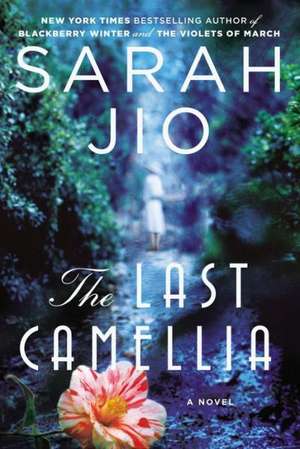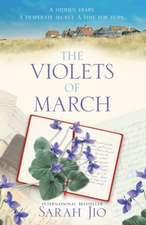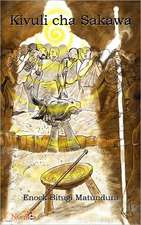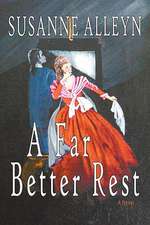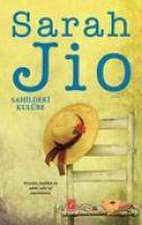The Last Camellia
Autor Sarah Jioen Limba Engleză Paperback – 27 mai 2013 – vârsta de la 18 ani
"Terrific … compelling … an intoxicating blend of mystery, history and romance, this book is hard to put down." --Real Simple
On the eve of the Second World War, the last surviving specimen of a camellia plant known as the Middlebury Pink lies secreted away on an English country estate. Flora, an amateur American botanist, is contracted by an international ring of flower thieves to infiltrate the household and acquire the coveted bloom. Her search is at once brightened by new love and threatened by her discovery of a series of ghastly crimes.
More than half a century later, garden designer Addison takes up residence at the manor, now owned by the family of her husband, Rex. The couple’s shared passion for mysteries is fueled by the enchanting camellia orchard and an old gardener’s notebook. Yet its pages hint at dark acts ingeniously concealed. If the danger that Flora once faced remains very much alive, will Addison share her fate?
On the eve of the Second World War, the last surviving specimen of a camellia plant known as the Middlebury Pink lies secreted away on an English country estate. Flora, an amateur American botanist, is contracted by an international ring of flower thieves to infiltrate the household and acquire the coveted bloom. Her search is at once brightened by new love and threatened by her discovery of a series of ghastly crimes.
More than half a century later, garden designer Addison takes up residence at the manor, now owned by the family of her husband, Rex. The couple’s shared passion for mysteries is fueled by the enchanting camellia orchard and an old gardener’s notebook. Yet its pages hint at dark acts ingeniously concealed. If the danger that Flora once faced remains very much alive, will Addison share her fate?
Preț: 129.56 lei
Nou
Puncte Express: 194
Preț estimativ în valută:
24.80€ • 25.76$ • 20.60£
24.80€ • 25.76$ • 20.60£
Carte indisponibilă temporar
Doresc să fiu notificat când acest titlu va fi disponibil:
Se trimite...
Preluare comenzi: 021 569.72.76
Specificații
ISBN-13: 9780452298392
ISBN-10: 0452298393
Pagini: 320
Dimensiuni: 142 x 211 x 18 mm
Greutate: 0.23 kg
Ediția:New.
Editura: Plume Books
ISBN-10: 0452298393
Pagini: 320
Dimensiuni: 142 x 211 x 18 mm
Greutate: 0.23 kg
Ediția:New.
Editura: Plume Books
Notă biografică
Sarah Jio is the #1 international, New York Times, and USA Today bestselling author of eight novels. She is also a longtime journalist who has contributed to Glamour, The New York Times, Redbook, Real Simple, O: The Oprah Magazine, Cooking Light, Woman’s Day, Marie Claire, Self, and many other outlets, including NPR’s Morning Edition, appearing as a commentator. Jio lives in Seattle with her three young boys.
Extras
Prologue
A cottage in the English countryside April 18, 1803
he old woman’s hand trembled as she clutched her teacup. Out of breath, she hadn’t stopped to wash the dirt from under her nails. She hovered over the stove, waiting for the teakettle to whistle as she eyed the wound on her finger, still raw. She’d clumsily cut it on the edge of the garden shears, and it throbbed beneath the bloodstained bandage. She’d tend to it later. Now she needed to come to her senses.
She poured water in the little white ceramic pot with the hairline crack along the edge and waited for the tea leaves to steep. Could it be? She’d seen a bloom, as clear as day. White with pink tips. The Middlebury Pink, she was certain of it. Her husband, rest his soul, had tended to the camellia for twenty years—sang to it in the spring, even covered its dark emerald leaves with a quilt when the frost came. Special, he’d called it. The woman hadn’t understood all the fuss over a scrawny tree, especially when the fields needed plowing and there were potatoes to be harvested.
If he could only see it now. In bloom. What if someone from the village finds it? No, she couldn’t let that happen. It was her responsibility to make sure of that.
Years ago, her husband spent sixpence on the tree, which was then just a sprout peeking out of a ceramic pot. The traveling salesman told him it had been propagated from a shoot at the base of the Middlebury Pink, the most beautiful camellia in all of England, and perhaps even the world. The only known cultivar, which produced the largest, most stunning blooms—white with pink tips— presided over the Queen’s rose garden inside the gates of the palace. Of course, the woman hadn’t believed the tale, not then, and she had scolded her husband for his foolishness in spending such a high price on what might be a weed, but in her heart, she did love to see him happy. And when he looked at the tree, he was happy. “I suppose it’s better than squandering money on drink,” she had said. “Besides, if it blooms, maybe we can sell the buds at the market.”
But the tree didn’t bloom. Not the first year or the second, or the third or fourth. And by the tenth year, the old woman had given up hope entirely. She grew bitter when her husband whispered to the tree in the mornings. He said he had read about the technique in a garden manual, but when she found him spritzing the tree with a mixture of water and her best vegetable soap, she didn’t care that he said it would ward off pests; her patience had worn thin. Sometimes she wished for a bolt of lightning to strike the tree, split it in two, so her husband could stop fawning over it the way he did. She thought, more than once, about taking an ax to its slim trunk and letting the blade slice through the green wood. It would feel good to take out her anger on the tree. But she refrained. And after the man died, the tree remained in the garden. Years passed, and the grass grew high around its trunk. The ivy wrapped its tendrils around the branches. The old woman paid no attention to the camellia until that morning, when a fleck of pink caught her eye. The single saucer-size blossom was more magnificent than she could ever have imagined. More beautiful than any rose she’d ever seen, it swayed in the morning breeze with such an air of royalty, the old woman had felt the urge to curtsey in its presence.
She took another sip of tea. The timing was uncanny. Just days ago, a royal decree had been issued notifying the kingdom that a rare camellia in the Queen’s garden had been decimated in a windstorm. Greatly saddened, the Queen had learned that a former palace gardener had propagated a seedling from the tree and sold it to a farmer in the countryside. She had ordered her footmen to search the country for her beloved tree’s descendant and to arrest the person who had harbored it all those years.
The woman stared ahead. She turned to the window when she heard horses’ hooves in the distance. Moments later, a knock sounded at the door, sending ripples through her tea. She smoothed the wisps of gray hair that had fallen loose from her bun, took a deep breath, and opened the door.
“Good day,” said a smartly dressed man. His tone was polite but urgent. “Upon orders from Her Majesty, we are searching the country for a certain valuable variety of camellia.” The woman eyed the man’s clothing—plain, common. He was an impostor; even she could tell. Her husband had warned her of the lot—flower thieves. Of course, it all fit. If they could get to the camellia before the Queen’s footmen, they could command a fortune for it. The man held a page in his hand, rolled up into a tight scroll. Unfurling it with great care, he pointed to the blossom painted on the page, white with pink tips.
The woman’s heart beat so loudly, she could hear nothing else.
“Do you know of its whereabouts?” the man asked. Without waiting for her reply, he turned to search the garden for himself.
The man walked along the garden path, past the rows of vegetables and herbs, trampling the carrot greens that had just pushed through the recently thawed soil. He stood looking ahead where the tulips had reared their heads through the black earth. He knelt down to pluck a bud, still green and immature, examining it carefully. “If you see the tree,” he said, twirling the tulip in his hand, before tossing it behind him, “send word to me in town. The name’s Harrington.”
The old woman nodded compliantly. The man gestured toward the north. Just over the hill was Livingston Manor. The lady of the house had been kind to them, offering to let them stay in the old cottage by the carriage house so long as they tended the kitchen garden. “Better not mention my visit to anyone at the manor,” the man said.
“Yes, sir,” the woman said hastily. She stood still, watching as he returned to his horse. When she could no longer hear the click-clack on the road, she followed the garden path past the pear tree near the fence until she came to the camellia bearing its one, glorious bloom.
No, she thought to herself, touching the delicate blossom. The Queen could search every garden in the land, and the flower thieves could examine every petal, but she would make sure they never found this one.
Chapter 1
Addison
New York City June 1, 2000
The phone rang from the kitchen, insistent, taunting. It might as well have been a stick of dynamite on the granite counter-top. If I didn’t pick it up after three rings, the answering machine would turn on. I cannot let the answering machine turn on.
“Are you getting that?” my husband, Rex, said from the couch, looking up from his notebook. He had an adorable fascination with old-school appliances. Typewriters, record players, and an answering machine circa 1987. But at that moment, I longed for voice mail. If only we had voice mail.
“I’ll get it!” I said, jumping up from the breakfast table and stubbing my toe on the leg of the chair. I winced. One ring. Two.
The hair on my arms stood on end. What if it was him? He had started calling two weeks ago, and every time the phone rang, I felt the familiar terror. Calm. Deep breath. Maybe it was one of my clients. That horrible Mrs. Atwell, the one who’d made me redo her rose garden three times. Or the IRS. Let it be the IRS. Anyone would be more welcome than the person I feared waited on the other end of the line.
If I turned off the machine, he’d call again. Like a shark sensing blood in the water, he’d keep circling until he got what he wanted.
I had to answer it. “Hello?” I said airily into the receiver.
Rex looked up, smiled at me, then returned to his notebook.
“Hello again, Addison.” His voice made me shiver. I couldn’t see him, of course, but I knew his face—the patchy stubble that grew around his chin, that amused look in his eyes. “You know, I don’t care for your new name. Amanda suited you much better.”
I remained silent, quickly opening the French doors and stepping outside onto the patio that overlooked a tiny patch of garden— rare for the city, but all ours. A bird chirped happily from the little camellia tree Rex and I had planted last year on our first wedding anniversary. I hated that he was trespassing on my private sanctuary.
“Listen,” I whispered. “I told you to stop calling me.” I looked up at the apartment building behind our townhouse, wondering if he could see me from one of the windows above.
“Amanda, Amanda,” he said, amused.
“Stop calling me that.”
“Oh, I forgot,” he continued. “You’re all fancy now. I read about your wedding in the paper.” He clicked his tongue scoldingly. “Quite the fairy-tale ending for a girl who—”
“Please,” I said. I couldn’t bear the sound of his voice, the way it made me think of the past. “Why can’t you leave me alone?” I begged.
“You mean, you don’t miss me? Think of all the good times we had together. You remember the way we used to—”
“Stop,” I said, cringing.
“Oh, I see how it is,” he said. “All stuck-up now that you married the King of England. You think you’re really something. Well, let me ask you this: Does your husband know who you really are? Does he know what you’ve done?”
I felt sick, woozy. “Please, please leave me alone,” I pleaded, feeling my throat tightening as I swallowed.
He laughed to himself. “But I can’t,” he said. “No. You see, I spent ten years of my life in prison. That’s a long time to think about things. And I thought a lot about you, Amanda. Almost every day.”
I shuddered. With him behind bars, I’d felt a false sense of security. His incarceration, for two felony counts of money laundering and a lesser charge of statutory rape, had felt like a thick, warm blanket wrapped around me. And now that he was out, the blanket had been ripped off. I felt exposed, frightened.
“Here’s the thing, baby,” he continued. “I’m sitting on a very valuable piece of information. I mean, you can’t blame me for wanting the same cushy life you have.”
“I’m going to hang up now,” I said, my finger hovering over the End Call button.
“This can all end well,” he said. “You know what I want.”
“I already told you I don’t have that kind of money.”
“You may not,” he said, “but your husband’s family does.”
“No, don’t bring them into this.”
“Well,” he said, “then I have no other choice.” I heard the chime of an ice cream truck on the other end of the line. I remembered chasing after those trucks as a little girl, wide-eyed, hopeful. I don’t know why; I never had a dollar for an ice cream sandwich, and yet they lured me still.
I pulled the phone from my ear and listened as the same notes sounded, a block away, perhaps. The melody struck terror in me. The truck was close. Too close.
“Where are you?” I asked, suddenly panicked.
“Why? You want to see me?” he said, amused. I could picture the menacing grin on his face.
My chin quivered. “Please, leave me alone,” I pleaded. “Can’t you just leave me alone?”
“It could have been so easy,” he said. “But you’ve tried my patience. If I don’t have the money by the end of the week, I’ll have no other choice but to tell your husband everything. And when I say ‘everything,’ I mean everything.”
“No,” I cried. “Please!”
I walked around the building and peered beyond the fence at the side yard. The ice cream truck motored past, slowly. Children cheered and squealed as the melodic chimes poured through the loudspeaker, and yet, with each note, I became increasingly paralyzed with terror. “You have five days, Amanda,” he said. “And, by the way, you look stunning in that dress. Blue’s your color.”
The line went dead, and I looked down at my blue linen dress, before turning to the street. The walnut tree in the distance. An old Honda with tinted windows and a rusty hood parked nearby. A bus stop that cast jagged shadows on the sidewalk.
I ran back to the house and closed the French doors, locking them behind me. “Let’s go to England,” I said to Rex, breathless.
He pushed his dark-rimmed glasses higher on the bridge of his nose. “really?” He looked confused. “I thought you didn’t want to make the trip. Why the change of heart?”
My in-laws had recently purchased a historic manor in the English countryside, and they’d invited Rex and me to stay there for the summer while they continued their travels throughout Asia, where Rex’s father, James, was working. Rex, whose novel-in-progress was set in a manor in the English countryside, thought it would be perfect for research. And we both shared a love of old homes. From what his mother, Lydia, had said on the phone, the estate brimmed with history.
But the timing was off. My landscape design business had enjoyed a surge of activity, and I was juggling four new clients, including a massive garden installation on a rooftop in Manhattan. It was a terrible time to leave. And yet now I had no choice. Sean didn’t know about the manor. He wouldn’t find me there. The trip would give me time to think.
My eyes darted around the living room nervously. “Well, I don’t. . . . I mean, I didn’t.” I sighed, collecting myself. “I’ve just been thinking it over, and, well, maybe we do need a getaway. Our anniversary is coming up.” I sat down on the couch beside him, twirling a lock of his shiny dark hair between my fingers. “I could explore the gardens, maybe even learn a thing or two; you know everyone’s crazy about English gardens here.” I was talking fast, the way I do when I’m worried. Rex could tell, I know, because he squeezed my hand.
“You’re nervous about the airplane, aren’t you, honey?” he said.
True, I did have a bit of airplane fright, and my doctor had prescribed Xanax for such moments. But, no, Rex didn’t know the real reason for my anxiety, and I could never let him find out.
There was a time when I believed I’d tell him the truth about me. But the longer I waited, the more it seemed impossible to open my mouth and utter the painful words. So I didn’t. Instead, I hid behind my carefully crafted story. A girl from a wealthy family in New Hampshire whose parents had died in a car accident years ago. The money that had all been lost in a fraudulent investment scheme. Rex had believed it all, believed in me. He didn’t wonder why I didn’t get Christmas cards or birthday calls. He didn’t ask if I wanted to visit my childhood home. He admired my strength, he said, that I could live in the present and not mourn the past. If only you knew.
I tucked my hand in his. “I’ll be fine,” I said. “And you said that the house would be the perfect place to really dig into your research—let’s do it, Rex. Let’s go.”
He smiled, touching my cheek lightly. “You know I’d love to make the trip, but only if you’re certain.”
“I am,” I said, shifting my gaze to the window and eyeing the rusty car parked on the street. I stood up and pulled the drapes closed. “The sun’s so bright today.” I continued, reaching for my phone, “I bet I can call the travel agency and get tickets for tomorrow.”
“really?” he said. “That quick?”
I forced a smile. “Why not? We might as well make the most of the summer.”
“Well,” he said, setting his notebook aside, “I’ll phone my parents and see about arrangements. Wait, what about your clients?”
I winced inwardly, remembering the intricate boxwood-lined courtyard I’d planned for a client and the adjoining butterfly garden for her two little girls. I’d promised that the installation would be in place by the end of next week, for her daughter’s birthday. My assistant, Cara, would have to oversee it all. She’d do a fine job, but it wouldn’t be the job I’d do. The astilbes wouldn’t be spaced perfectly. The hebe wouldn’t be clipped into smooth spheres the way I’d envisioned. I sighed. I knew I couldn’t stay, not with the dark cloud that hovered. I just had to make sure it didn’t follow me to England.
“Ready?” Rex asked in the doorway the next evening. I’d managed to book us two seats on the nine p.m. direct flight to London.
“Yeah,” I said from the doorstep, cinching my scarf higher on my neck. I took a few steps toward the cab waiting at the sidewalk, then froze.
Rex looked at me. “Is that the phone ringing?”
I shivered, looking back at the house. The ring was muffled but detectable.
“Should I run back and get it?”
“No,” I said, hurrying to the car. “Let’s not stop. We’ll miss our plane.”
A cottage in the English countryside April 18, 1803
he old woman’s hand trembled as she clutched her teacup. Out of breath, she hadn’t stopped to wash the dirt from under her nails. She hovered over the stove, waiting for the teakettle to whistle as she eyed the wound on her finger, still raw. She’d clumsily cut it on the edge of the garden shears, and it throbbed beneath the bloodstained bandage. She’d tend to it later. Now she needed to come to her senses.
She poured water in the little white ceramic pot with the hairline crack along the edge and waited for the tea leaves to steep. Could it be? She’d seen a bloom, as clear as day. White with pink tips. The Middlebury Pink, she was certain of it. Her husband, rest his soul, had tended to the camellia for twenty years—sang to it in the spring, even covered its dark emerald leaves with a quilt when the frost came. Special, he’d called it. The woman hadn’t understood all the fuss over a scrawny tree, especially when the fields needed plowing and there were potatoes to be harvested.
If he could only see it now. In bloom. What if someone from the village finds it? No, she couldn’t let that happen. It was her responsibility to make sure of that.
Years ago, her husband spent sixpence on the tree, which was then just a sprout peeking out of a ceramic pot. The traveling salesman told him it had been propagated from a shoot at the base of the Middlebury Pink, the most beautiful camellia in all of England, and perhaps even the world. The only known cultivar, which produced the largest, most stunning blooms—white with pink tips— presided over the Queen’s rose garden inside the gates of the palace. Of course, the woman hadn’t believed the tale, not then, and she had scolded her husband for his foolishness in spending such a high price on what might be a weed, but in her heart, she did love to see him happy. And when he looked at the tree, he was happy. “I suppose it’s better than squandering money on drink,” she had said. “Besides, if it blooms, maybe we can sell the buds at the market.”
But the tree didn’t bloom. Not the first year or the second, or the third or fourth. And by the tenth year, the old woman had given up hope entirely. She grew bitter when her husband whispered to the tree in the mornings. He said he had read about the technique in a garden manual, but when she found him spritzing the tree with a mixture of water and her best vegetable soap, she didn’t care that he said it would ward off pests; her patience had worn thin. Sometimes she wished for a bolt of lightning to strike the tree, split it in two, so her husband could stop fawning over it the way he did. She thought, more than once, about taking an ax to its slim trunk and letting the blade slice through the green wood. It would feel good to take out her anger on the tree. But she refrained. And after the man died, the tree remained in the garden. Years passed, and the grass grew high around its trunk. The ivy wrapped its tendrils around the branches. The old woman paid no attention to the camellia until that morning, when a fleck of pink caught her eye. The single saucer-size blossom was more magnificent than she could ever have imagined. More beautiful than any rose she’d ever seen, it swayed in the morning breeze with such an air of royalty, the old woman had felt the urge to curtsey in its presence.
She took another sip of tea. The timing was uncanny. Just days ago, a royal decree had been issued notifying the kingdom that a rare camellia in the Queen’s garden had been decimated in a windstorm. Greatly saddened, the Queen had learned that a former palace gardener had propagated a seedling from the tree and sold it to a farmer in the countryside. She had ordered her footmen to search the country for her beloved tree’s descendant and to arrest the person who had harbored it all those years.
The woman stared ahead. She turned to the window when she heard horses’ hooves in the distance. Moments later, a knock sounded at the door, sending ripples through her tea. She smoothed the wisps of gray hair that had fallen loose from her bun, took a deep breath, and opened the door.
“Good day,” said a smartly dressed man. His tone was polite but urgent. “Upon orders from Her Majesty, we are searching the country for a certain valuable variety of camellia.” The woman eyed the man’s clothing—plain, common. He was an impostor; even she could tell. Her husband had warned her of the lot—flower thieves. Of course, it all fit. If they could get to the camellia before the Queen’s footmen, they could command a fortune for it. The man held a page in his hand, rolled up into a tight scroll. Unfurling it with great care, he pointed to the blossom painted on the page, white with pink tips.
The woman’s heart beat so loudly, she could hear nothing else.
“Do you know of its whereabouts?” the man asked. Without waiting for her reply, he turned to search the garden for himself.
The man walked along the garden path, past the rows of vegetables and herbs, trampling the carrot greens that had just pushed through the recently thawed soil. He stood looking ahead where the tulips had reared their heads through the black earth. He knelt down to pluck a bud, still green and immature, examining it carefully. “If you see the tree,” he said, twirling the tulip in his hand, before tossing it behind him, “send word to me in town. The name’s Harrington.”
The old woman nodded compliantly. The man gestured toward the north. Just over the hill was Livingston Manor. The lady of the house had been kind to them, offering to let them stay in the old cottage by the carriage house so long as they tended the kitchen garden. “Better not mention my visit to anyone at the manor,” the man said.
“Yes, sir,” the woman said hastily. She stood still, watching as he returned to his horse. When she could no longer hear the click-clack on the road, she followed the garden path past the pear tree near the fence until she came to the camellia bearing its one, glorious bloom.
No, she thought to herself, touching the delicate blossom. The Queen could search every garden in the land, and the flower thieves could examine every petal, but she would make sure they never found this one.
Chapter 1
Addison
New York City June 1, 2000
The phone rang from the kitchen, insistent, taunting. It might as well have been a stick of dynamite on the granite counter-top. If I didn’t pick it up after three rings, the answering machine would turn on. I cannot let the answering machine turn on.
“Are you getting that?” my husband, Rex, said from the couch, looking up from his notebook. He had an adorable fascination with old-school appliances. Typewriters, record players, and an answering machine circa 1987. But at that moment, I longed for voice mail. If only we had voice mail.
“I’ll get it!” I said, jumping up from the breakfast table and stubbing my toe on the leg of the chair. I winced. One ring. Two.
The hair on my arms stood on end. What if it was him? He had started calling two weeks ago, and every time the phone rang, I felt the familiar terror. Calm. Deep breath. Maybe it was one of my clients. That horrible Mrs. Atwell, the one who’d made me redo her rose garden three times. Or the IRS. Let it be the IRS. Anyone would be more welcome than the person I feared waited on the other end of the line.
If I turned off the machine, he’d call again. Like a shark sensing blood in the water, he’d keep circling until he got what he wanted.
I had to answer it. “Hello?” I said airily into the receiver.
Rex looked up, smiled at me, then returned to his notebook.
“Hello again, Addison.” His voice made me shiver. I couldn’t see him, of course, but I knew his face—the patchy stubble that grew around his chin, that amused look in his eyes. “You know, I don’t care for your new name. Amanda suited you much better.”
I remained silent, quickly opening the French doors and stepping outside onto the patio that overlooked a tiny patch of garden— rare for the city, but all ours. A bird chirped happily from the little camellia tree Rex and I had planted last year on our first wedding anniversary. I hated that he was trespassing on my private sanctuary.
“Listen,” I whispered. “I told you to stop calling me.” I looked up at the apartment building behind our townhouse, wondering if he could see me from one of the windows above.
“Amanda, Amanda,” he said, amused.
“Stop calling me that.”
“Oh, I forgot,” he continued. “You’re all fancy now. I read about your wedding in the paper.” He clicked his tongue scoldingly. “Quite the fairy-tale ending for a girl who—”
“Please,” I said. I couldn’t bear the sound of his voice, the way it made me think of the past. “Why can’t you leave me alone?” I begged.
“You mean, you don’t miss me? Think of all the good times we had together. You remember the way we used to—”
“Stop,” I said, cringing.
“Oh, I see how it is,” he said. “All stuck-up now that you married the King of England. You think you’re really something. Well, let me ask you this: Does your husband know who you really are? Does he know what you’ve done?”
I felt sick, woozy. “Please, please leave me alone,” I pleaded, feeling my throat tightening as I swallowed.
He laughed to himself. “But I can’t,” he said. “No. You see, I spent ten years of my life in prison. That’s a long time to think about things. And I thought a lot about you, Amanda. Almost every day.”
I shuddered. With him behind bars, I’d felt a false sense of security. His incarceration, for two felony counts of money laundering and a lesser charge of statutory rape, had felt like a thick, warm blanket wrapped around me. And now that he was out, the blanket had been ripped off. I felt exposed, frightened.
“Here’s the thing, baby,” he continued. “I’m sitting on a very valuable piece of information. I mean, you can’t blame me for wanting the same cushy life you have.”
“I’m going to hang up now,” I said, my finger hovering over the End Call button.
“This can all end well,” he said. “You know what I want.”
“I already told you I don’t have that kind of money.”
“You may not,” he said, “but your husband’s family does.”
“No, don’t bring them into this.”
“Well,” he said, “then I have no other choice.” I heard the chime of an ice cream truck on the other end of the line. I remembered chasing after those trucks as a little girl, wide-eyed, hopeful. I don’t know why; I never had a dollar for an ice cream sandwich, and yet they lured me still.
I pulled the phone from my ear and listened as the same notes sounded, a block away, perhaps. The melody struck terror in me. The truck was close. Too close.
“Where are you?” I asked, suddenly panicked.
“Why? You want to see me?” he said, amused. I could picture the menacing grin on his face.
My chin quivered. “Please, leave me alone,” I pleaded. “Can’t you just leave me alone?”
“It could have been so easy,” he said. “But you’ve tried my patience. If I don’t have the money by the end of the week, I’ll have no other choice but to tell your husband everything. And when I say ‘everything,’ I mean everything.”
“No,” I cried. “Please!”
I walked around the building and peered beyond the fence at the side yard. The ice cream truck motored past, slowly. Children cheered and squealed as the melodic chimes poured through the loudspeaker, and yet, with each note, I became increasingly paralyzed with terror. “You have five days, Amanda,” he said. “And, by the way, you look stunning in that dress. Blue’s your color.”
The line went dead, and I looked down at my blue linen dress, before turning to the street. The walnut tree in the distance. An old Honda with tinted windows and a rusty hood parked nearby. A bus stop that cast jagged shadows on the sidewalk.
I ran back to the house and closed the French doors, locking them behind me. “Let’s go to England,” I said to Rex, breathless.
He pushed his dark-rimmed glasses higher on the bridge of his nose. “really?” He looked confused. “I thought you didn’t want to make the trip. Why the change of heart?”
My in-laws had recently purchased a historic manor in the English countryside, and they’d invited Rex and me to stay there for the summer while they continued their travels throughout Asia, where Rex’s father, James, was working. Rex, whose novel-in-progress was set in a manor in the English countryside, thought it would be perfect for research. And we both shared a love of old homes. From what his mother, Lydia, had said on the phone, the estate brimmed with history.
But the timing was off. My landscape design business had enjoyed a surge of activity, and I was juggling four new clients, including a massive garden installation on a rooftop in Manhattan. It was a terrible time to leave. And yet now I had no choice. Sean didn’t know about the manor. He wouldn’t find me there. The trip would give me time to think.
My eyes darted around the living room nervously. “Well, I don’t. . . . I mean, I didn’t.” I sighed, collecting myself. “I’ve just been thinking it over, and, well, maybe we do need a getaway. Our anniversary is coming up.” I sat down on the couch beside him, twirling a lock of his shiny dark hair between my fingers. “I could explore the gardens, maybe even learn a thing or two; you know everyone’s crazy about English gardens here.” I was talking fast, the way I do when I’m worried. Rex could tell, I know, because he squeezed my hand.
“You’re nervous about the airplane, aren’t you, honey?” he said.
True, I did have a bit of airplane fright, and my doctor had prescribed Xanax for such moments. But, no, Rex didn’t know the real reason for my anxiety, and I could never let him find out.
There was a time when I believed I’d tell him the truth about me. But the longer I waited, the more it seemed impossible to open my mouth and utter the painful words. So I didn’t. Instead, I hid behind my carefully crafted story. A girl from a wealthy family in New Hampshire whose parents had died in a car accident years ago. The money that had all been lost in a fraudulent investment scheme. Rex had believed it all, believed in me. He didn’t wonder why I didn’t get Christmas cards or birthday calls. He didn’t ask if I wanted to visit my childhood home. He admired my strength, he said, that I could live in the present and not mourn the past. If only you knew.
I tucked my hand in his. “I’ll be fine,” I said. “And you said that the house would be the perfect place to really dig into your research—let’s do it, Rex. Let’s go.”
He smiled, touching my cheek lightly. “You know I’d love to make the trip, but only if you’re certain.”
“I am,” I said, shifting my gaze to the window and eyeing the rusty car parked on the street. I stood up and pulled the drapes closed. “The sun’s so bright today.” I continued, reaching for my phone, “I bet I can call the travel agency and get tickets for tomorrow.”
“really?” he said. “That quick?”
I forced a smile. “Why not? We might as well make the most of the summer.”
“Well,” he said, setting his notebook aside, “I’ll phone my parents and see about arrangements. Wait, what about your clients?”
I winced inwardly, remembering the intricate boxwood-lined courtyard I’d planned for a client and the adjoining butterfly garden for her two little girls. I’d promised that the installation would be in place by the end of next week, for her daughter’s birthday. My assistant, Cara, would have to oversee it all. She’d do a fine job, but it wouldn’t be the job I’d do. The astilbes wouldn’t be spaced perfectly. The hebe wouldn’t be clipped into smooth spheres the way I’d envisioned. I sighed. I knew I couldn’t stay, not with the dark cloud that hovered. I just had to make sure it didn’t follow me to England.
“Ready?” Rex asked in the doorway the next evening. I’d managed to book us two seats on the nine p.m. direct flight to London.
“Yeah,” I said from the doorstep, cinching my scarf higher on my neck. I took a few steps toward the cab waiting at the sidewalk, then froze.
Rex looked at me. “Is that the phone ringing?”
I shivered, looking back at the house. The ring was muffled but detectable.
“Should I run back and get it?”
“No,” I said, hurrying to the car. “Let’s not stop. We’ll miss our plane.”
Descriere
On the eve of the Second World War, the last surviving specimen of a camellia plant known as the Middlebury Pink lies secreted away on an English country estate. Flora, an amateur American botanist, is contracted by an international ring of flower thieves to infiltrate the household and acquire the coveted bloom.
